
When you think of epic tech fails, it’s a long list. That’s because for every iPod, there was the Apple Newton, the company’s first attempt at a personal digital assistant or PDA way back in 1993.
Along the way, there have been some high-profile busts, including Samsung Galaxy Note 7. Remember? It was the phone that had a tendency to catch on fire, thanks to its lithium-ion batteries. I remember being on Delta flights back in 2017 when the phone shipped. As flight attendants warned about unacceptable devices onboard the plane, that product was being name-checked in front of thousands of passengers a day.
Then there was Microsoft’s Windows 8 release in 2012. Its design was so different and daunting that people bought new computers with its software, and then installed the older, familiar, and reliable earlier system, Windows 7. Rather than becoming the next version of Microsoft’s ubiquitous computer software, most of us would rather forget it ever existed.
But Amazon’s Alexa? It doesn’t belong on this infamous list of tech tragedies. After all, it was Jeff Bezos’ baby, a device that has sold millions since its successful launch back in 2014. It was even showcased in Amazon’s Super Bowl commercial two years later, featuring Alec Baldwin and Dan Marino.
But two weeks ago, Business Insider’s Eugene Kim wrote a story with this blaring headline:
Kim tells the story of those recent Amazon layoffs, many of the job cuts coming directly out of Team Alexa. While Bezos may have viewed Alexa as his pet project, Kim paints a picture of massive losses.
We’re talking $3 billion in the first quarter of this year alone, much of them tied to Amazon’s Alexa. Now faced with “the biggest layoffs in the company’s history,” Kim says Alexa is a product without a purpose.
For the record, Amazon’s SVP of devices and services, David Limp, disputes Kim’s dire assertions, noting the company is “as committed as ever to Echo and Alexa, and will continue to invest heavily in them.”
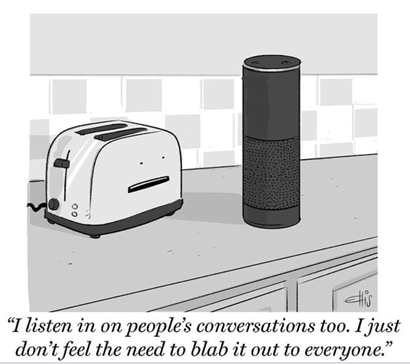
Along the way, there’s been controversy, especially surrounding the device “listening to conversations,” the most mentioned reason why millions of consumers categorically refuse to bring Alexa into their homes.
Other problems included the device “mistakenly sending voice recordings to the wrong person” or Amazon employees clandestinely listening to private voice interactions with the Echo.
Remember “laughing Alexa?” Some owners reported “she” would break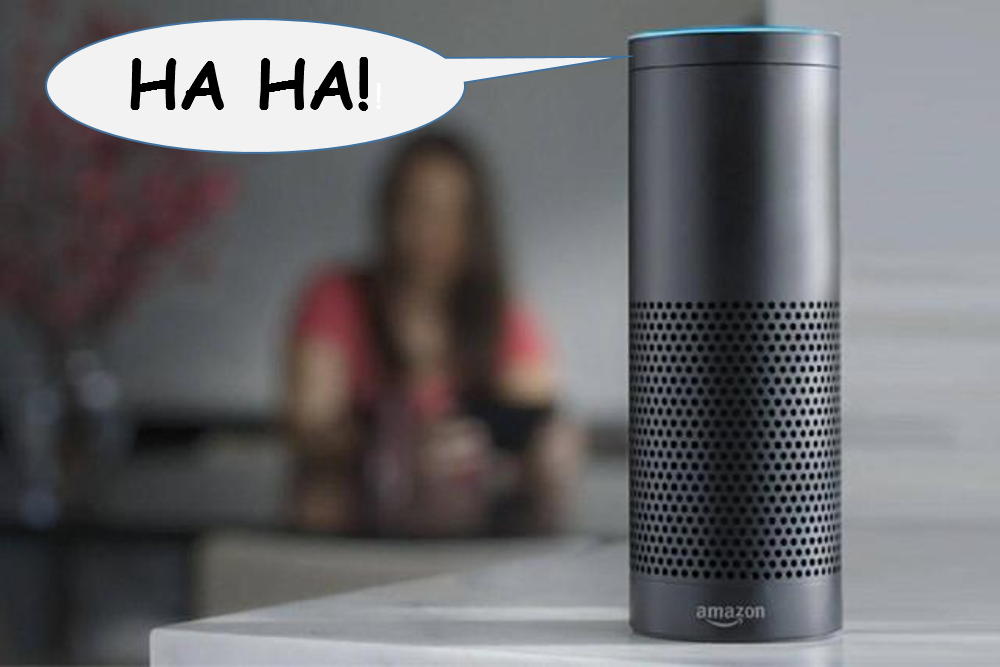 out in unsettling laughter for no reason. (It was later discovered the culprit was misinterpreted voice commands.)
out in unsettling laughter for no reason. (It was later discovered the culprit was misinterpreted voice commands.)
Nonetheless, the legend grew. And sales flattened. Earlier this year, Techsurvey 2022 confirmed what other researchers were discovering: the once-meteoric rise of smart speaker sales had flatlined.
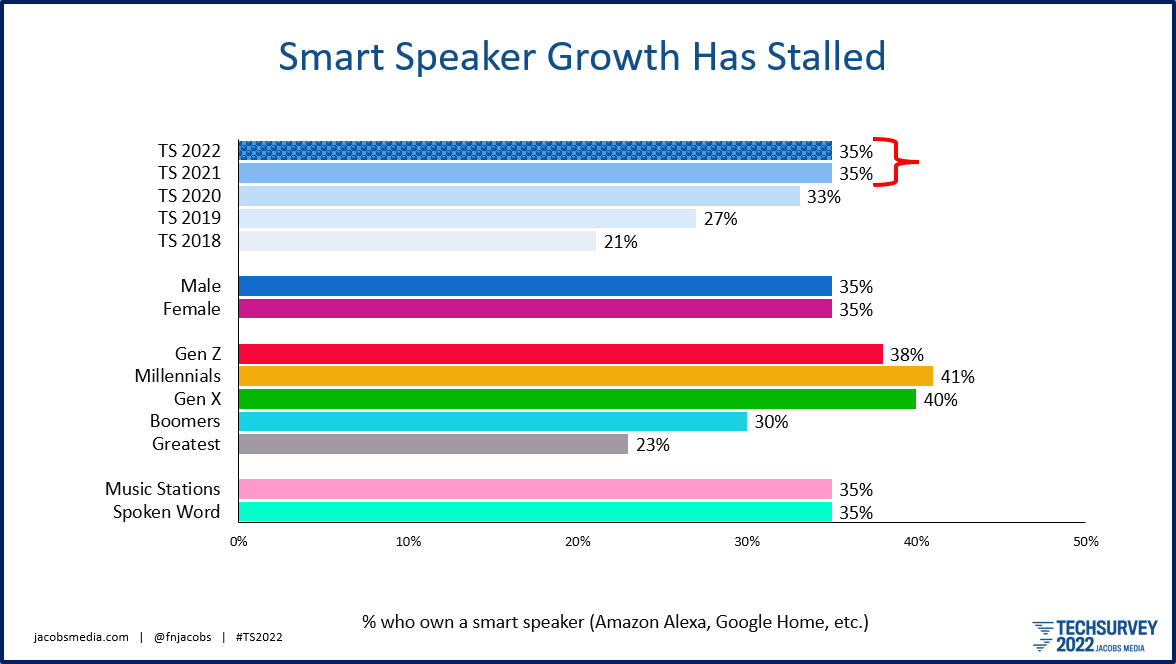
The other problem involves “use cases.” Most forget the original purpose of the Echo line was to facilitate buying Amazon products via voice. But once again, Alexa has a credibility problem, and many owners exhibited hesitancy to engage in financial transactions on the device.
Early Alexa partnership attempts with Domino’s Pizza and Uber fizzled. And in the process, sales spreadsheets were tucked away in desk drawers.
An Amazon internal memo states people were using the product – just not in the way the company valued: “Alexa was getting a billion interactions a week, but most of those conversations were trivial commands to play music or ask about the weather.”
Or listen to the radio.
In fact, our Public Radio Techsurvey this year confirmed the #1 use case for these devices among fans is to listen to radio stations.
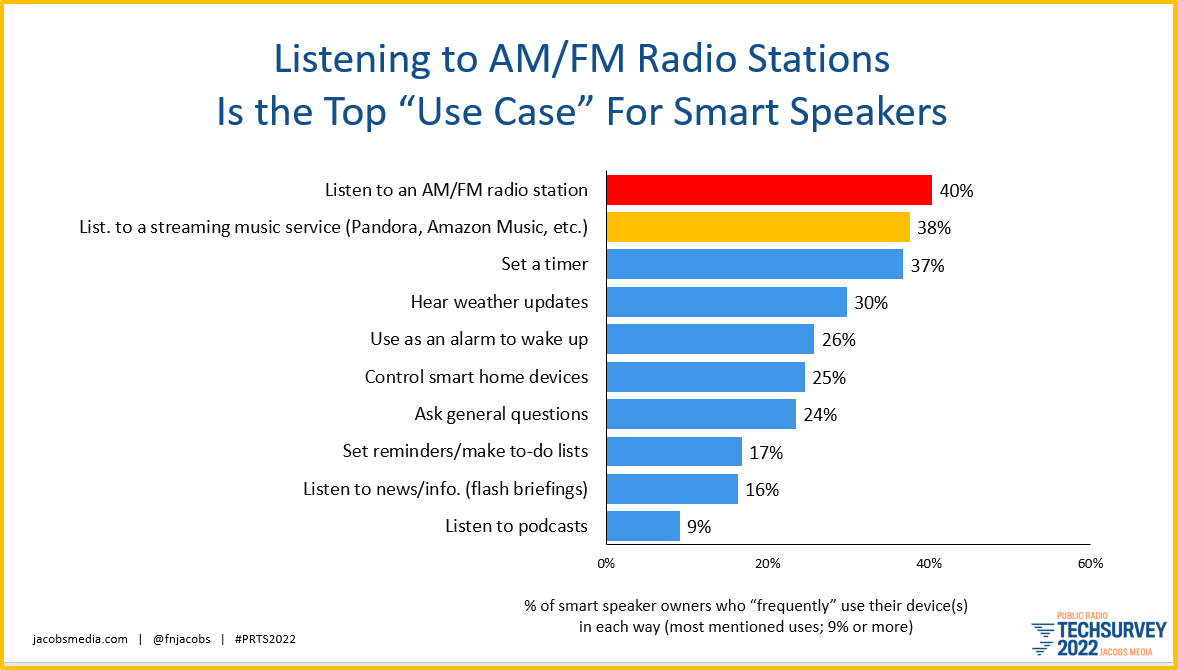
That stat might make the CEO of NPR happy but it does nothing for new Amazon boss, Andy Jassy. Alexa’s interactions with broadcast radio aren’t monetizable – at least, not yet.
Ars Technica’s Ron Amadeo suggests the issue isn’t just an Alexa problem – it’s running through the entire smart speaker industry. As an Amazon employee reportedly told Business Insider, “‘There’s no clear directive for (these) devices’ in the future.”
Clearly, Alexa is having a midlife crisis.
And if the product continues to get back-burnered by Amazon, broadcast radio will feel the pain. Despite smart speaker fits and starts, many radio stations and their parent companies have enjoyed impressive usage metrics.
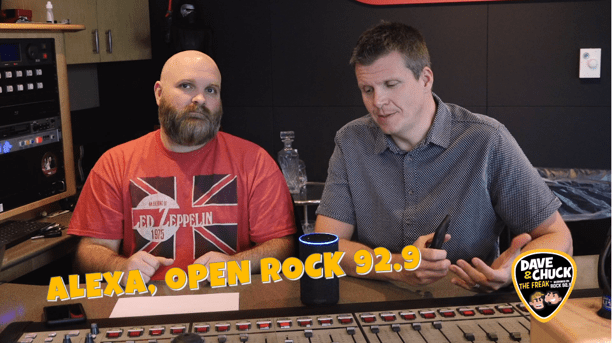 More and more – and radio station on-air and website promotion for smart speakers has been effective – consumers are using Alexa and friends to listen to their favorite radio stations. That habit became even more engrained during the early months of COVID when so many consumers ended up housebound – without a working radio.
More and more – and radio station on-air and website promotion for smart speakers has been effective – consumers are using Alexa and friends to listen to their favorite radio stations. That habit became even more engrained during the early months of COVID when so many consumers ended up housebound – without a working radio.
In the early days of smart speakers, I attended an NAB Board meeting in D.C. where the topic of this then-emerging technology came up. One radio CEO suggested making the trek to Amazon headquarters to convince the powers-that-be to install an FM chip into their Echo line of products.
While that was a patently absurd idea, the thought of arranging a group of radio’s smartest digital emissaries to fly to Seattle to meet with the Alexa team may not be such a bad idea.
Except this time, the meeting wouldn’t be about a chip, but a marketing and promotional collaboration between broadcast radio and Amazon’s digital department. Yes, marketing Alexa would be part of the mission, but so would putting together campaigns with the many retail brands already advertising on the radio (and those that once did).
Radio is still a “windshield medium,” connecting with consumers where they live, work, and play. Listening is still most common while folks are behind the wheel. And isn’t that where Amazon has worked so hard to get Alexa into cars?
https://www.youtube.com/watch?v=kDhbT0smVag
Somewhere in all of this, the NAB and RAB should be able to sniff out the opportunity.
And follow the money.
For Alexa – and radio – it’s no longer a laughing matter.
Jacobs Media’s curated CES Tours include a stop at Alexa Auto, your chance to ask questions about voice, radio, and cars. Info here.
- The Exponential Value of Nurturing Radio Superfans - April 28, 2025
- What To Do If Your Radio Station Goes Through A Midlife Crisis - April 25, 2025
- A 2020 Lesson?It Could All Be Gone In A Flash - April 24, 2025




Wow, number one use for Alexa is radio. Who knew? Yes, that’s one behemoth of an all-too rare opportunity for radio…if it takes it.
If Amazon truly wants to get Alexa/Echo into the car, they’ll have to collaborate with radio. How about this: The vehicle needs a “talkback” channel (probably using cell data, paid for by Amazon) so that the occupant(s) can respond to something they’ve heard on the radio, and the head unit has to be smart enough not only to hear the person speaking but also to coordinate what’s spoken with the stimulus.
For example,
(1) The radio plays an ad for something the driver is interested in, all he/she should need to do is say, “Alexa, buy me one of those (or two or ten).” Because Alexa knows whose car she’s in, the name, address, delivery preference, and credit card info are already loaded and Alexa recognizes the voice as one authorized to place an order. The product, or maybe concert ticket, arrives in a day or two.
(2) Driver hears a song he loves and says so. Pandora-like, Alexa shares this vote with the broadcaster, who can accumulate audience response info and use it to (a) inform programming decisions and (b) sell to record companies.
With another cup of coffee I could probably imagine some more synergies, but those are a start.